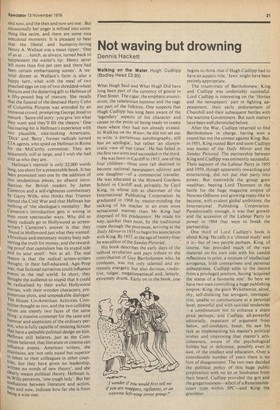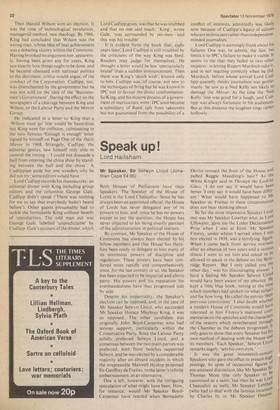Not waving but drowning
Dennis Hackett
Walking on the Water Hugh Cudlipp (Bodley Head £5.95) What Hugh Said and What Hugh Did have long been part of the currency of gossip in Fleet Street. The cigar, the emphatic enunciation, the rabelaisian humour and the rage are part of the folklore. One suspects that Hugh Cudlipp has long been aware of the 'legendary' aspects of his character and career to the point of being ready to create them where they had not already existed. In Walking on the Water, he did not set out to write 'a portentous autobiography, still less an apologia', but rather 'an idiosyncratic view of our times'. He has failed in the first two aims and succeeded in the third.
He was born in Cardiff in 1913, one of the four children— three sons (all destined to become national newspapers editors) and one daughter—of a commercial traveller. He was educated at the Howard Gardens School in Cardiff and, privately, by Cecil King, to whose job as chairman of the International Publishing Corporation he graduated in 1968 by master-minding the sacking of his teacher in an even more sensational manner than Mr King had disposed of his predecessor. He made his way, quicker than most, by the traditional route through the provinces, arriving at the Daily Mirror in 1935 to begin his association with King. By 1937, at the age of twenty-four he was editor of the Sunday Pictorial.
His book describes the early days of the tabloid revolution and pays tribute to the contribution of Guy Bartholomew who, he confesses, was not only talented and extremely energetic but also devious, vindictive, vulgar, megalomaniacal and, latterly, extremely drunk. Early on in the book, one begins to think that if Hugh Cudlipp had to have an aquatic title, 'Jaws' might have been entirely appropriate.
The triumvirate of Bartholomew, King and Cudlipp was undeniably successful. Lord Cudlipp is interesting on the 'thirties and the newspapers' part in fighting appeasement, their early endorsement of Churchill and their subsequent battles with the wartime Government. But such matters have been well chronicled before.
After the War, Cudlipp returned to find Bartholomew in charge, having won a round but not the contest against King. But, in 1951, King ousted Bart and soon Cudlipp was master of the Daily Mirror and the Sunday Pictorial. The partnership between King and Cudlipp was eminently successful. Their support of the Labour Party in 1955 and 1959, though apparently rewarding and entertaining, did not put that party into power. But meanwhile the group grew wealthier, beating Lord Thomson in the battle for the huge magazine empire of Newnes-Odhams and growing topsy-like to become, with evident global ambitions, the International Publishing Corporation. Paradoxically enough, it was that growth and the accession of the Labour Party to power in 1964 that were to break the partnership.
One third of Lord Cudlipp's book is about King. 'He calls it a 'clinical study' and it is—but of two people perhaps. King, of course, has provided much of the raw material on his own side with his candid reflections in print, a mixture of intellectual arrogance, Irish contrariness and personal unhappiness. Cudlipp adds to the record from a privileged position, having 'acquired the status of a favourite son'. So here we have two men controlling a huge publishing empire: King, the giant Wykehamist, aloof, shy, self-disliking but arrogant, introspective, unable to communicate at a personal level, powerful and with suicidal tendencies —a combination not to enhance a share price perhaps; and "Cudlipp, all-powerful editorially, impatient of argument from below, self-confident, brash. He saw his task as implementing his master's political wishes and improving that master's articulateness, aware of the psychological foibles but in deference, possibly even in awe, of the intellect and education. Over a considerable number of years there is no hint of disagreement. The two men decided the political policy of this huge public corporation with no let or hindrance from their board. Cudlipp provided the grit and the gregariousness—albeit of a Renaissancecourt type within IPC—and King the grandeur. Then Harold Wilson won an election. It was the time of technological revolution, managerial method, new theology. By 1966, King had concluded that Wilson was the wrong man, whose idea of real achievement was a debating victory within the Commons. Having brooked no argument nor, apparently, having been given any for years, King saw exactly how things ought to be done, and he became obsessed with national politics to the detriment, critics would argue, of the conduct of the Corporation. Cudlipp, too, was disenchanted by the government but he was not sold on the idea of the 'Businessmen's Government', fearing the effect on the newspapers of a cleavage between King and Wilson, or the Labour Party and the Mirror Group.
He indicated in a letter to King that a 'Wilson must go' line would be hazardous but King went for collision, culminating in the now famous 'Enough is enough' letter signed by himself on Page One of the Daily Mirror in 1968. Strangely, Cudlipp, the editorial genius, saw himself only able to control the timing-1 could not dissuade a bull from entering the china shop by standing between the bull and the china'. A Cudlippian aside but one wonders why he did not try; some editors would have.
Lord Cudlipp records his manoeuvres: an editorial dinner with King including group editors and the columnist George Gale. Cudlipp didn't speak ('There was nothing for me to say that everybody hadn't heard before'). Other guests presumably had to tackle the formidable King without benefit of introduction. The odd man out was George Gale, labelled 'unpredictable' by Cudlipp. Gale's account of t he dinner, which Lord Cudlipp gives, was that he was snubbed and that no one said much : 'King', wrote Gale, 'was surrounded by yes-men--and this was his trouble'.
It is evident from the book that, eight years later, Lord Cudlipp is still troubled by the criticisms of the way King was fired. Readers may judge for themselves. He thought a letter would be less 'spectacularly brutal' than a sudden announcement. Then there was King's 'death wish', known only to him. Cudlipp was, of course, not new to the techniques of firing but he was known in I PC not to favour the direct confrontation. So King, and his bizarre dreams of a government of meritocrats, went ; I PC soon became a subsidiary of Reed, safe from takeovers but not guaranteed from the possibility of a
conflict of interests, admittedly less likely now because of Cudlipp's legacy of editors who are technicians rather than independentminded journalists.
Lord Cudlipp is seemingly frank about his failures. One was, he admits, the Sun, but limits it to I PC's failure to make it viable. It seems to me that they failed in two other respects: in letting Rupert Murdoch take it, and in not reacting correctly when he did.. Murdoch, before whose arrival Lord Cudlipp quaintly thinks journalism was gentlemanly, he saw as a Ned Kelly not likely to damage the Mirror. At the time the 'Ned Kelly' line was good for a laugh, and Cudlipp was always fortunate in his audiences. But at this distance the laughter rings rather hollowly.



































 Previous page
Previous page